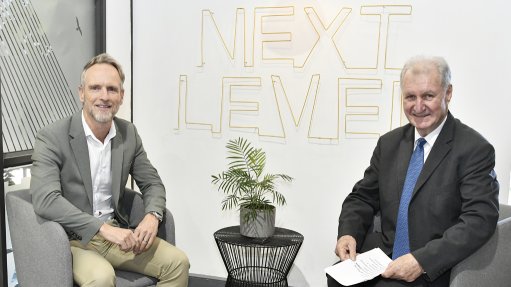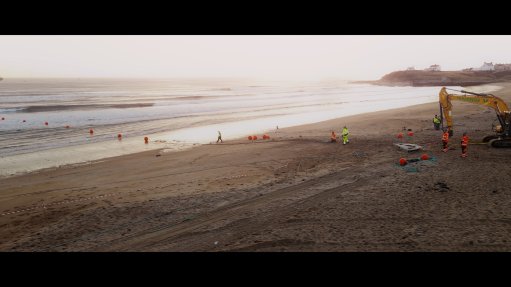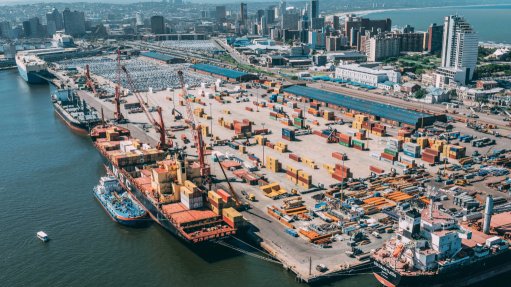Afrimat's interim earnings decrease, but diversification, efficiency improvements continue
Midtier mining company Afrimat reported a 14.5% decrease in headline earnings a share to 252.2c for the six months ended August 31.
The Afrimat board declared an interim gross dividend of 40c a share – on par with the previous comparable period.
The company said this was in line with a decrease in operating profit, from R582.8-million to R512.2-million in the previous period, resulting in the operating profit margin declining from 24.1% to 19.7%.
However, group revenue increased by 7.2%, from R2.4-billion to R2.6-billion.
Afrimat CEO Andries van Heerden said strategic initiatives contributed positively to performance in the first six months of the financial year. These included the successful commissioning of the Jenkins iron-ore mine, in the Northern Cape; the turnaround of the Nkomati anthracite mine, in Mpumalanga; and continued efforts to improve operations.
“Diversification, cost reduction and efficiency improvements remain the cornerstone of our strategy and we used these to counter economic impacts, which are beyond our control,” he added.
Despite using strategic initiatives to offset the impacts, he noted that the company's results had been negatively affected by the downturn in iron-ore prices, an overall economic slowdown and the rise in input costs such as diesel, explosives and electricity.
He said the balance sheet remained strong, however, with a net cash balance of R772.7-million. Net cash from operating activities of R784.1-million was generated, as well as R680-million from a successful equity raise during the period.
“At present, the group is considered debt free as the cash balance exceeds the borrowings, with sufficient capital to execute strategic plans to support Afrimat’s future growth,” Van Heerden said, adding that new business development remained a key aspect of the growth strategy.
Van Heerden said the group’s carbon neutrality strategy continued to be carried out, with extensive studies having been undertaken to determine the main detractors.
“An initial renewable energy project to reduce carbon emissions is underway at Glen Douglas Dolomite [in Gauteng],” he said.
OPERATIONAL REVIEW
Afrimat traditionally consisted of three operating units – construction materials, industrial minerals and bulk commodities. However, a new operating unit – future materials and metals, consisting of phosphate, vermiculite and rare earth elements – has expanded Afrimat’s product offering and national footprint.
The bulk commodities operating unit, consisting of the Demaneng and Jenkins iron-ore mines, and the Nkomati anthracite mine, contributed 76.8% to the group’s operating profit.
Van Heerden said this strong result was largely owing to increased volumes from Jenkins coming into production, the successful turnaround of Nkomati and from startup losses, which turned to profitability from August 2021, as well as cost-saving initiatives. He added that the Jenkins mine, which was now fully operational, together with the Demaneng mine, in the Northern Cape, had produced an increase of 21.9% in iron-ore sales volume during the current period compared to the previous period.
“Although the operating profit decreased due to the decline in the iron-ore price and a rise in input costs, a healthy operating profit margin of 37% was generated from the iron-ore mines,” he said.
During the year, the first blast was undertaken at Driehoekspan, the iron-ore asset that will replace Demaneng once it is mined out of the next four years, which is expected to be in four years’ time. Driehoekspan and Doornpan, both in the Northern Cape, will be brought into production to maintain export volumes, and have a combined life-of-mine in excess of 15 years.
Van Heerden said an innovative technology solution had been rolled out at Jenkins across the mine fleet, which improved efficiency and resulted in significant cost savings, countering the rise in diesel prices and the fall in iron-ore prices.
“Nkomati, now profitable, contributed 25.5% to the segment’s revenue for the period. It produces a high-quality product sold into the local market as a replacement for imported anthracite, and is recognised as a consistent, dependable supplier,” he said.
He added that long-term sustainable production was being enhanced by opening two opencast pits and the continued development of the underground operations.
“The first anthracite is expected to be extracted early in the new calendar year from these developments,” he said.
Van Heerden noted that the economic slowdown was felt within Afrimat’s industrial minerals segment, resulting in a decrease in operating profit from R49.6-million to R36.8-million.
Moreover, the construction materials segment experienced the brunt of the slowdown in economic activity, with Afrimat’s Western Cape businesses being impacted the most owing to an overall reduction in construction across the province. However, the KwaZulu-Natal businesses showed improvement over the previous period, primarily as a result of an uptick in construction.
The operating profit for the construction materials segment showed a slight decrease from R77.8-million to R73.1-million from the previous comparative period.
The new operational segment, future materials and metals, was added to the group’s operational segments in support of its diversification strategy.
“[Phosphate mine] Glenover [in Limpopo] is a new project and one which diversifies our exposure wider than ferrous metals and aligns to global trends. It brings us a threefold exposure – fertiliser for agricultural applications, vermiculite for industrial and horticultural applications, and rare earth elements that support technological advancements such as high strength permanent magnets and battery technology,” he said.
Van Heerden said sales were currently being generated from high-grade phosphate, or fertiliser, material, with testing and design work currently under way for vermiculite and single super phosphate plants.
“Stage 2, which includes test work for nitrophosphate and rare earth processes, is making good progress. After we complete this stage, detailed designs will inform the final capital requirements,” he explained, noting that the board had approved R300-million to buy Glenover out.
During the period under review, Glenover generated revenue of R17.8-million with startup losses of R3.9-million.
“The group is in the process of ramping up this operation, with site establishment already completed,” Van Heerden said.
He added that, with respect to Gravenhage, in the Northern Cape, the deal had been terminated, but reiterated that Afrimat still had access to manganese through the Driehoekspan mine, where Afrimat was targeting volumes of about 240 000 t/y.
PROSPECTS
Van Heerden said Afrimat continued to focus on sustainable diversification in all segments.
“In the new future materials and metals segment, the focus is to ramp up the production of high-grade phosphate and to execute the next phases of the project as seamlessly as possible,” he said.
He added that the bulk commodities segment has implemented an internal efficiency drive with new solutions technology, and that these solutions would now be implemented throughout the group to further improve efficiencies and margins.
“We have Driehoekspan and Doornpan to bring online once Demaneng volumes begin to reduce. This should be within the next four years. To optimise production, Nkomati is in the process of opening up two opencast mine areas, as well as an underground access point. Volumes are expected to ramp up and the processing plant is well maintained and able to take on additional production,” Van Heerden said.
“Operational efficiency initiatives aimed at expanding volumes, reducing costs and developing the required skill levels across all employees, remain a key focus in all operations,” he added.
Article Enquiry
Email Article
Save Article
Feedback
To advertise email advertising@creamermedia.co.za or click here
Comments
Press Office
Announcements
What's On
Subscribe to improve your user experience...
Option 1 (equivalent of R125 a month):
Receive a weekly copy of Creamer Media's Engineering News & Mining Weekly magazine
(print copy for those in South Africa and e-magazine for those outside of South Africa)
Receive daily email newsletters
Access to full search results
Access archive of magazine back copies
Access to Projects in Progress
Access to ONE Research Report of your choice in PDF format
Option 2 (equivalent of R375 a month):
All benefits from Option 1
PLUS
Access to Creamer Media's Research Channel Africa for ALL Research Reports, in PDF format, on various industrial and mining sectors
including Electricity; Water; Energy Transition; Hydrogen; Roads, Rail and Ports; Coal; Gold; Platinum; Battery Metals; etc.
Already a subscriber?
Forgotten your password?
Receive weekly copy of Creamer Media's Engineering News & Mining Weekly magazine (print copy for those in South Africa and e-magazine for those outside of South Africa)
➕
Recieve daily email newsletters
➕
Access to full search results
➕
Access archive of magazine back copies
➕
Access to Projects in Progress
➕
Access to ONE Research Report of your choice in PDF format
RESEARCH CHANNEL AFRICA
R4500 (equivalent of R375 a month)
SUBSCRIBEAll benefits from Option 1
➕
Access to Creamer Media's Research Channel Africa for ALL Research Reports on various industrial and mining sectors, in PDF format, including on:
Electricity
➕
Water
➕
Energy Transition
➕
Hydrogen
➕
Roads, Rail and Ports
➕
Coal
➕
Gold
➕
Platinum
➕
Battery Metals
➕
etc.
Receive all benefits from Option 1 or Option 2 delivered to numerous people at your company
➕
Multiple User names and Passwords for simultaneous log-ins
➕
Intranet integration access to all in your organisation


















